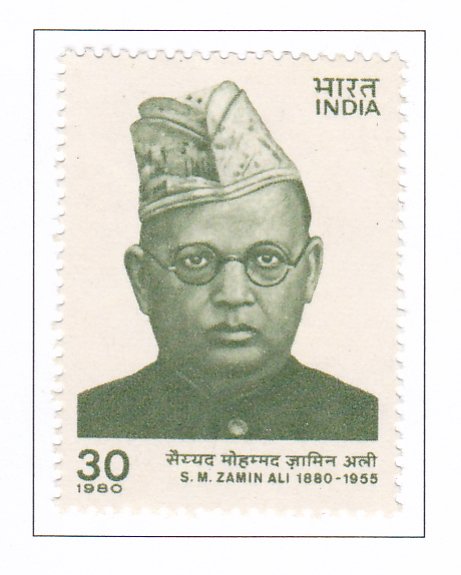Syed Mohammad Zamin Ali (1880-1955) Commemoration

Technical Data
| Date of Issue | June 25, 1980 |
|---|---|
| Denomination | 30 p |
| Quantity | 2,000,000 |
| Perforation | comb 13 |
| Printer | Security Printing Press, Nashik |
| Watermark | Large Star and 'INDIA GOVT' (Sh) [Up] |
| Colors | Bronze green |
| Catalog Codes |
Michel IN 832 Stamp Number IN 866 Yvert et Tellier IN 627 Stanley Gibbons IN 972 |
| Themes | Commemoration | Famous people | Headgear | Literary People (Poets and Writers) | Optical Instruments | Teachers |
Syed Mohammad Zamin Ali stands as a luminary in the domain of Urdu language and literature, leaving an indelible mark through his pioneering efforts in academia. Born on June 25, 1880, in Mustafabad village, Rae Bareli district, Uttar Pradesh, Zamin Ali was the youngest son of Syed Wajid Ali. His lineage boasted literary prowess, with his grandfather, Nauroz Ali, recognized as a notable poet of his era.
Zamin Ali’s educational journey took him through Agra and Allahabad, where he distinguished himself academically. After a stellar academic career, he joined the faculty of the Persian and Arabic Department at Allahabad University. His visionary proposal to establish separate Departments of Urdu and Hindi studies, previously under the Oriental Department, was realized in 1922 under the leadership of Sir Ganganath Jha, the Vice Chancellor.
As a trailblazer in Urdu academia, Zamin Ali designed the foundational framework for Urdu studies, from undergraduate to research levels, at Allahabad University. He played a pivotal role in formulating the curriculum for Urdu language and literature across various universities. His scholarly compilations and books on poets and marsiya writers became integral parts of academic syllabi.
Among his notable contributions is the monumental work “Urdu Zaban-e-Adab,” a comprehensive exploration of Urdu linguistics surpassing even renowned works like Sir George Grierson’s “Linguistic Survey of India.” Zamin Ali’s literary lineage traced back to the Lucknow School of Poetry, and his compositions, including ghazals and marsiyas, reflected elegance and clarity of thought.
Beyond academia, Zamin Ali was actively involved in literary circles and cultural initiatives. He co-founded the Hindustani Academy in 1926, following Mahatma Gandhi’s vision, and served as the editor of its Urdu Section in the bilingual magazine “Hindustani.” Additionally, he edited the magazine “Naisa.”
Zamin Ali’s legacy reverberates through the words of Pandit Nehru, who hailed him as “the most brilliant crusader for the cause of Urdu of my time.” His contributions to education and literature remain unparalleled, and the Indian Posts and Telegraphs Department pays homage to his memory by issuing a special postage stamp, commemorating his enduring legacy as a great educator and poet.
